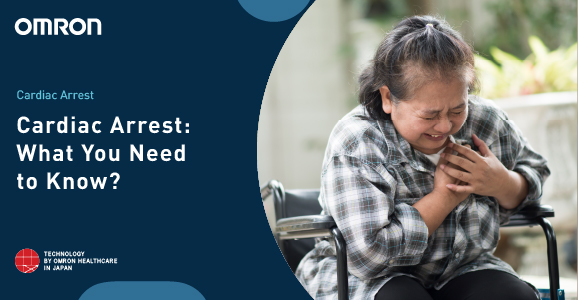Cardiac Arrest: What You Need to Know?
June 21, 2024 2024-09-16 10:29Cardiac Arrest: What You Need to Know?

Cardiac Arrest: What You Need to Know?
What is Cardiac Arrest?
Cardiac arrest, also known as sudden cardiac arrest, is when the heart stops beating suddenly. The lack of blood flow to the brain and other organs can cause a person to lose consciousness, become disabled or die if not treated immediately. Certain arrhythmias that stop the heart from pumping blood can lead to cardiac arrests. A cardiac arrest is a medical emergency. When a cardiac arrest happens outside of a hospital, 90% of victims die, often within minutes.
Cardiac arrest can occur without any symptoms at all. These signs might be present before a cardiac arrest:
- Sudden collapse and becoming unconscious (pass out)
- Holding their breath, breathing poorly, or gasping for air
- No reaction when someone yells or shakes
- No pulse
- Fatigue
- Dizziness
- Chest pain
- Heart palpitations
- Nausea
Cardiac arrest symptoms may pose a severe threat to life.
What causes Cardiac Arrest?
Heart problems may be the cause of cardiac arrest, or it may happen suddenly. Nonetheless, cardiac arrest has three primary causes:
- Ventricular fibrillation and arrhythmia: An irregular heartbeat is caused by an issue with the electrical impulses in the heart. Arrhythmias such as ventricular fibrillation are the most frequent cause of cardiac arrest. Ventricular fibrillation is characterized by a fast pulse in the ventricle of the heart, which makes the heart quiver rather than pump blood as usual.
- Cardiac enlargement (cardiomyopathy): Abnormal cardiac contractions result from the thickening or dilation of the heart muscle.
- Coronary artery disease: This kind of heart disease is brought on by plaque buildup and narrowing of the coronary arteries, which limits blood flow to the heart. Coronary artery disease can cause arrhythmias or heart failure, both of which can result in cardiac arrest if left untreated.
Other potential reasons for cardiac arrest include:
- Loss of blood
- Heart valve problems
- Insufficient oxygen
- Elevated potassium and magnesium levels in the body (may induce arrhythmia)
What is the difference between Cardiac Arrest & Heart Attack?
Although the words “heart attack” and “cardiac arrest” are sometimes used synonymously, they refer to two distinct cardiac diseases. When an artery blockage prevents blood flow to the heart, a heart attack happens. The heart’s muscular tissue will deteriorate as a result of the heart’s lack of blood and oxygen. Because heart attacks can change the electrical signals in the heart, they can raise the risk of cardiac arrest. A heart attack is more likely to be the cause of sudden cardiac arrest in the absence of any other heart problems.
Are you at risk of Cardiac Arrest?
There are several genetic and lifestyle variables that might raise the risk of cardiac arrest. Some of them are the following:
- Abuse of drugs or alcohol
- Cardiac arrest or heart disease in the family
- Heart conditions
- Elevated blood pressure
- Elevated cholesterol
- Low magnesium or potassium (deficiency in nutrients)
- Being overweight
- Consuming tobacco
Heart arrest can happen to certain people, even in the absence of any risk factors. Cardiac arrest is more common among older men than in women.
How is Cardiac Arrest treated?
When someone goes into cardiac arrest, they must be treated immediately to ensure that more oxygen-rich blood reaches their organs.
- Cardiopulmonary resuscitation
Cardiopulmonary resuscitation (CPR), a process in which a second person pushes the chest to promote blood flow to the organs, is typically the primary course of therapy. Until the individual experiencing cardiac arrest has access to more advanced emergency treatment, CPR can alleviate the condition momentarily.
- Defibrillator
In order to preserve the patient’s life and prevent more organ damage from oxygen and blood shortage, this therapy should be started very soon. Trained first responders utilize defibrillators. Like a defibrillator, an automated external defibrillator (AED) is available in some public places which can identify dangerous arrhythmias.
What is the recovery process after Cardiac Arrest?
If treatment for cardiac arrest is not received within minutes, the patient may die. If lifestyle modifications are required to lower the risk of cardiac arrest or other consequences, a physician will offer advice when the patient is discharged from the hospital. A cardiologist can be consulted regularly to assess how the heart’s electrical system is functioning and to create a plan of care to keep electrical levels within normal ranges.
How to prevent Cardiac Arrest?
You can lower your risk of cardiac arrest and other acquired heart problems by adopting the following lifestyle changes:
- Consuming heart-healthy food
- Getting in shape Exercise
- Giving up drugs and smoking
- Reducing alcohol consumption
In summary, knowledge of cardiac arrest warning indicators, underlying causes, and available prompt treatments is essential for preserving lives. We can improve outcomes for individuals impacted by this sudden and potentially fatal disease by raising awareness and educating others about automated external defibrillators (AEDs) and CPR. Remember, swift action may make all the difference, so keep yourself informed and ready to respond when necessary.






